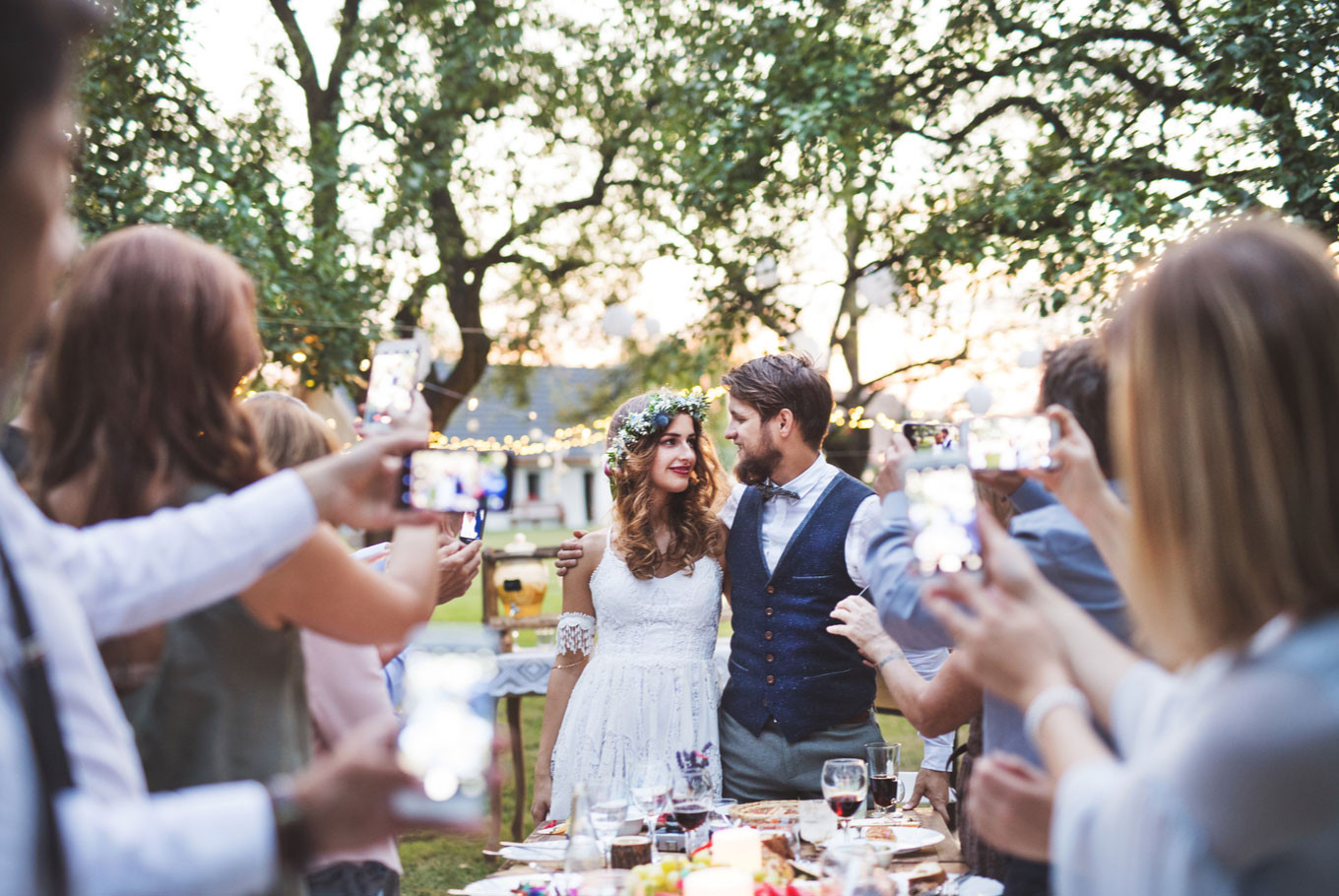Popular Reads
Top Results
Can't find what you're looking for?
View all search resultsPopular Reads
Top Results
Can't find what you're looking for?
View all search resultsMarried with technology: Are smartphones ruining weddings?
In today’s typical wedding, a vast number of phones still intercede as each guest’s third eye.
Change text size
Gift Premium Articles
to Anyone
I
t is a beautiful morning. Sunlight fills the chapel, flowers are in place and we, the photographers of the day, are too. The bride finally appears, gliding gracefully down the aisle — she walks into a scene so beautiful she takes in every possible detail. The flowers and morning sunlight, the heavenly music coming from the choir. The love of her life, a father by her side and the backs of everyone’s smartphones, pointed at her glowing, beautiful self.
Working for weddings has its fair share of airtight circumstances. Racing with time, handling pressure, all while remaining as invisible as you can. For photographers, regardless of what people assume, getting a winning shot is no easy task in itself.
But getting a winning shot through a wall of smartphones is nearly impossible.
The integration of phones into our day-to-day lives is anything but new — it happens in music concerts, sports games, brunch dates and the like. But in an event as sacred as a wedding, it raises the question: Are they still entirely necessary?
In today’s typical wedding, a vast number of phones still intercede as each guest’s third eye. As a result, that winning shot we work so hard for often doesn’t come as clean as we’d like. Ideally, in the scene the bride walks past a crowd of smiling guests, all marveling at her beauty, laughing and clapping. Nowadays, she walks through a crowd with eyes fixated on their screens and with faces replaced by the backs of their smartphones, at such a proximity they’re impossible to miss.
It was still considered normal around the time camera phones were first introduced. But now, when every third cousin has an Instagram story to update and when every aunt or uncle has an iPad with HD-quality camera, the situation is no longer ideal. Not only does this affect the professionally taken photographs, but the wedding experience itself may also decrease significantly.
Some brides admit it’s upsetting to walk down an aisle and not be able to see the guests’ facial expressions. While for grooms, their “first look” moments often find many disruptions.
“When a bride’s walking down the aisle, typically people would lean in and take photos,” photographer Natalija Brunovs told Australia's ABC, “often the groom can’t even see the bride because she’s obstructed by all his guests.”
Wedding photographers understand how special the day is for everyone in the room, but it is difficult to deliver our best work — which we’ve been adequately paid to do — when guests insist on doing it for themselves.
It is a different story, however, for weddings that freely allow their guests to capture to their hearts’ content. While some couples find smartphones troubling, wedding hashtags now play a massive part in the wedding industry and community. They enable couples to have a digital catalog of their special day, curated and taken by their beloved guests.
“I’d prefer for my guests to be present in the moment, but in a large wedding I realize it needs more effort,” newlywed Jacinda from Surabaya says of the matter. “So I think phones should still be allowed with larger audiences; we can also see their footage during our wedding.”
But another alternative stands for those who wish to leave it to the professionals. Those in the industry would call it an “unplugged wedding”.
In an unplugged wedding, guests refrain from using their phones during the ceremony and/or reception. While “banning” phone cameras may sound a bit harsh, the objective is to make the most out of the traditional wedding experience.
Carla Salvatori, who held an intimate wedding herself, recalls: “It was wonderful to look into the crowd and be able to make eye contact with friends and family.”
Photographer Daniel Fewchuk from Sydney is also on board with the idea. “It makes my job easier; there are no distracting phones and the couple’s eyes are on my lens,” he told the Sydney Morning Herald. “These shots will be in albums for 80 years, not [just on] Instagram for eight hours.”
With no smartphones in sight, the wedding photos created appear much more timeless. But another considerable reason to have an unplugged wedding is because it enhances our ability to remember the event.
A 2017 study in the United States found that media usage diminishes a person’s memory of experiences. The mechanism is plain sailing — once we trust that our device has the moment recorded and eternalized, our brains make less effort to record it for us.
Emma Templeton, a psychology researcher from Dartmouth who co-authored the study, explains: “It could be that [because] we’re using these devices, we’re distracting ourselves from the experience.”
Read also: Candid pictures new trend for pre-wedding photography
The easiest way to have an unplugged wedding is to have your master of ceremonies or officiant announce it from the beginning. Alternatively, you can include it on the invitations or wedding pamphlets that are handed out. Although some guests are still likely to break this rule, at least you’ve established expectations and formally requested for them to be met beforehand.
If a further step is necessary to keep those shutterbugs at bay, one can inform the guests about the professional team already documenting the event.
Louis Amal, a Melbourne-based photographer, reminds his clients every time. “We tell them to inform the guests that photographers and videographers will be present on the day,” he states.
Another method Louis suggests is for guests to contact the couple for records of the wedding. “They can contact us if they want the photos and we would gladly send them to them,” he says. “The photos would be of much better quality and this way the wedding can run a lot more smoothly.”
When you’ve hired a professional team, rest assured that the wedding coverage is fully taken care of. The once-in-a-lifetime event deserves to be enjoyed without everyone turning into photographers themselves.
Above all, an unplugged wedding encourages us to leave behind the notion that a moment recorded is equal to a moment cherished. During this heavy shift into a digital era, it’s crucial to remember how to be present in memories as they unfold.
Perhaps it’s time to rethink our way of honoring weddings and any of our life’s biggest milestones. Perhaps it’s time to recognize that the best way to improve our recollection of the experience is none other than by consciously, wholeheartedly experiencing it.
***
Joanne Amarisa Pangkey is a design student currently studying in RMIT University, Melbourne, Australia. You can find her writing, taking photos or sketching random sceneries. Most of her work can be viewed in her blog (www.withrisa.com) and Instagram (@joanneamarisa).











